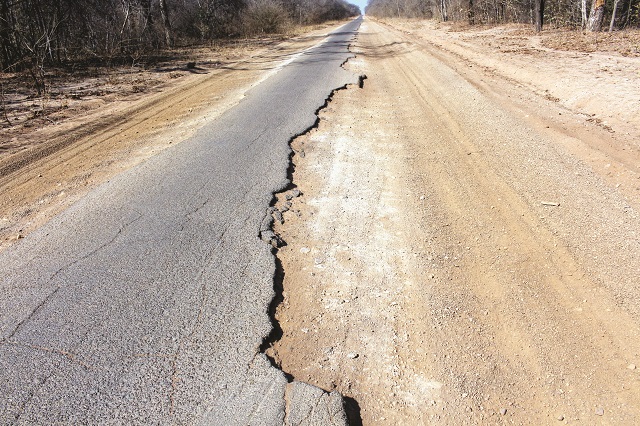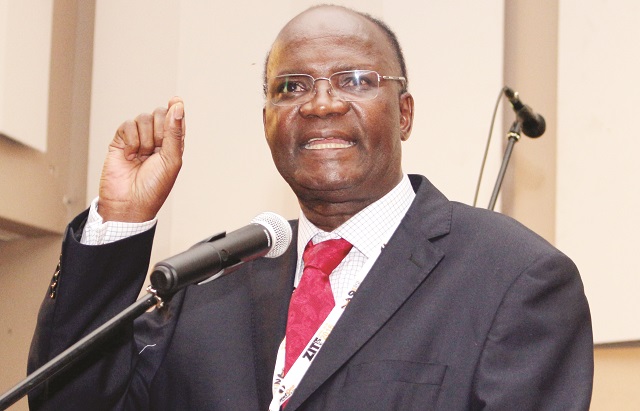Let local authorities develop, maintain own infrastructure

Saul Gwakuba Ndlovu
The Government is now wide awake to the deplorable condition of roads throughout the country.
Recently, the Minister of Local Government, Public Works and National Housing Saviour Kasukuwere, was shocked by the condition of Harare roads. He described the situation as “a state of disaster”.
Meanwhile, in Bulawayo another Government minister Cde Sithembiso Nyoni, told a meeting at which she had arrived three hours late that she had delayed because she had to use a circuitous route instead of the Bulawayo-Nkayi Road because it (Bulawayo-Nkayi) is unusable.
The Bulawayo-Nkayi Road has been in a very, very poor condition for more than 20 years, and has been a subject of several news items by this publication.
Some money has recently been disbursed to some local Government authorities to enable them to repair some of their roads.
However, not much has been done by those councils because it is only recently that the Central Government released the funds, and also because the amounts are meagre, much too little to rehabilitate each local authority’s many devastated roads.
The problem about the deteriorating condition of the country’s roads has been with the nation for a long period.
With the exception of some roads in a few districts such as Mazoe, Bindura, Gokwe, Mhondoro, Shamva, most of the country’s roads have not been graded for more than six years. The graders must be lying unused somewhere in the districts. Why?
Most probably because there is not enough money for their fuel and maintenance. A year or two ago, information went the rounds in Bulilima and Mangwe that a grader in one of those districts could not be used because its fan-belt had snapped!
It could not be replaced because Plumtree had neither a spare belt nor money with which to buy a replacement.
Meanwhile, roads in both districts are getting worse daily. The same applies to those in neighbouring districts, that is Tsholotsho and Matobo.
In virtually every district, many formerly tarred roads have become ungraded gravel tracks, with potholes along their entire lengths and across their breadths.
A few days ago, national broadcaster ZBC interviewed a public road consultant in Harare. He said roads could last longer if people walked or used bicycles from Mabvuku, Mufakose, Dzivarasekwa, Chitungwiza to Harare or from and to wherever around Harare and its environs.
He said heavy trucks must be restricted by law to travel along major roads during stipulated hours instead of right round the clock.
The interviewee was in effect telling the people of Zimbabwe to return to the 19th century when African people depended on their legs to get from one place to another.
He seemed not to be aware that today’s modes of transport offer comfort, protection from unfriendly weather conditions, from wild animals, and, above all, save time, an extremely vital factor in today’s socio-economic environment.
A nation with more than 10 universities should be able to solve its infrastructural problems without resorting to outmoded, primitive lifestyles such as walking from one urban or peri-urban centre to another.
To suggest that Zimbabwe should restrict heavy road traffic to certain hours is to propose Zimbabwe’s exclusion of the Sadc’s heavy road traffic from within its borders.
Why should it be that heavy traffic is able to move unhindered in Botswana, South Africa, Zambia, Malawi, Mozambique, the DRC, Rwanda, Burundi, Namibia, Lesotho and Swaziland but not in Zimbabwe?
Some people who pose as consultants on one issue or another have not got the brains to identify the role of modern technology in industrialisation. Good journalists should avoid interviewing such charlatans because they offer nothing usable.
The solution to Zimbabwe’s public road disintegration lies first and foremost in changing the country’s governance to enable local authorities to husband their own resources so as to develop and maintain their own infrastructure.
That can be done at least by way of devolution. Devolution can empower councils to deal effectively with the raising and expenditure of their respective resources. It has been intimated that devolution or federation could change the country’s present political party power balance. That is not true.
If we take the recent election results as examples. Bikita West and Chimanimani West would remain as Zanu-PF as they are except that the local councils would have more authority over some of their own affairs.
So, whichever political party is in power, it would direct and control the infrastructural development of villages, wards, districts and provinces.
Zimbabwe has a very high unemployment level. That simply means that the country is awash with manpower. Devolution or federalisation could create responsibilities for villages, wards, districts and provinces to develop their own social, cultural and economic projects, a process that could generate much employment. It could also give them legal power.
Road-making and maintenance could be some of that employment created at that local level. We are referring here to rural areas particularly and urban centres generally.
Funding for whatever projects could be a responsibility of each local authority, but could be through the traditional two ways, taxation and borrowing.
In the rural areas, the old colonial “unit tax” could be modified and adopted as, most probably, village tax. Ancillary taxes could be introduced at rates that take each province’s economic realities into practical consideration.
Borrowing could be sanctioned and guaranteed by the central government which would maintain a “guarantee fund” to which every local authority would be legally obliged to contribute a stipulated amount annually.
The amount paid by each local authority to the “guarantee fund” would inevitably differ from one local authority to another because of demographic and economic differences among the local authorities, resulting in differences in their tax earnings.
Management of whatever projects would be by local personnel who would be answerable to the local authority concerned.
We should appreciate that motivation is always high where and when local people are actively involved in any project from its very inception.
In cases of roads, local people take much pride in building no less than in using them. With proper planning, Zimbabwe’s roads can and should be repaired and maintained since all materials used are locally procured and not imported, and so is labour.
Saul Gwakuba Ndlovu is a retired, Bulawayo-based journalist. He can be contacted on cell 0734 328 136 or through email. [email protected]










Comments